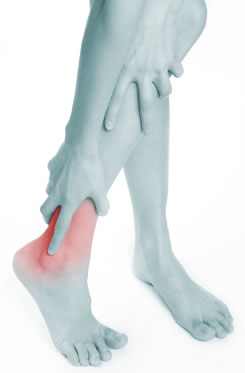 Although the Achilles tendon can withstand great stresses from running and jumping, it is also prone to tendinitis, a condition associated with overuse and degeneration. Simply defined by your New Orleans orthopaedic specialists, tendinitis is inflammation of a tendon. Inflammation is the body’s natural response to injury or disease, and often causes swelling, pain, or irritation.
Although the Achilles tendon can withstand great stresses from running and jumping, it is also prone to tendinitis, a condition associated with overuse and degeneration. Simply defined by your New Orleans orthopaedic specialists, tendinitis is inflammation of a tendon. Inflammation is the body’s natural response to injury or disease, and often causes swelling, pain, or irritation.
Achilles tendinitis is a common condition that causes pain along the back of the leg near the heel. The Achilles tendon is the largest tendon in the body that connects your calf muscles to your heel bone and is used when you walk, run, and jump.
Symptoms of Achilles Tendonitis
Common symptoms of Achilles tendinitis include:
- Pain and stiffness along the Achilles tendon in the morning;
- Pain along the tendon or back of the heel that worsens with activity;
- Severe pain the day after exercising;
- Thickening of the tendon;
- Bone spur;
- Swelling that is present all the time and gets worse throughout the day with activity.
Note: If you have experienced a sudden “pop” in the back of your calf or heel, you may have torn your Achilles tendon. See your doctor immediately if you think you may have torn your tendon.
Diagnosis of Achilles Tendonitis
After you describe your symptoms and discuss your concerns, your orthopaedic specialists in New Orleans will examine your foot looking for signs of:
- Swelling along the Achilles tendon or at the back of your heel;
- Thickening or enlargement of the Achilles tendon;
- Bony spurs at the lower part of the tendon at the back of your heel;
- The point of maximum tenderness;
- Pain in the middle of the tendon;
- Pain at the back of your heel at the lower part of the tendon;
- Limited range of motion in your ankle—specifically, a decreased ability to flex your foot
Your orthopaedic surgeon may order x-rays or an MRI to make sure your symptoms are caused by Achilles tendinitis.
Treatment of Achilles Tendonitis
In most cases, nonsurgical treatment options will provide pain relief, although it may take a few months for symptoms to completely subside. Even with early treatment, the pain may last longer than 3 months. If you have had pain for several months before seeking treatment, it may take 6 months before treatment methods take effect.
Surgery should be considered to relieve Achilles tendinitis only if the pain does not improve after 6 months of nonsurgical treatment. The specific type of surgery depends on the location of the tendinitis and the amount of damage to the tendon as determined by your New Orleans orthopaedic specialists.
We want to be your trusted Orthopaedic Specialists in New Orleans. If you are experiencing the symptoms of Achilles Tendonitis, please call our office at 504-897-7877 and a member of our caring staff will be happy to help you.
Thank you for trusting us with your care!